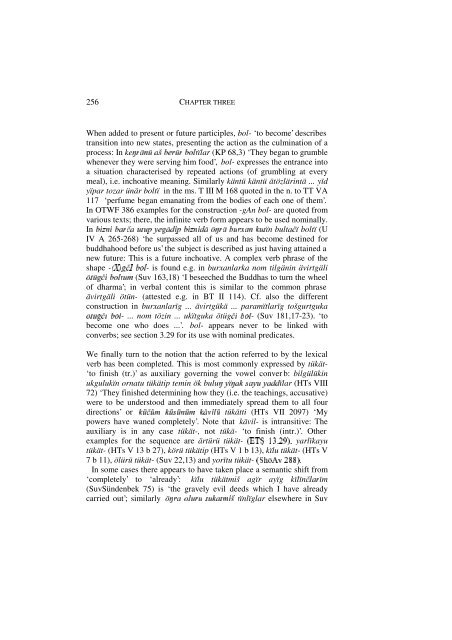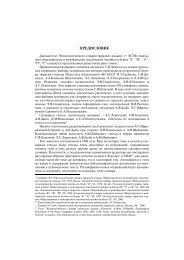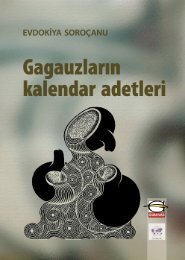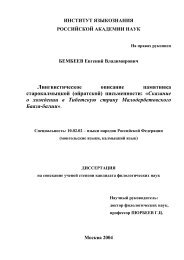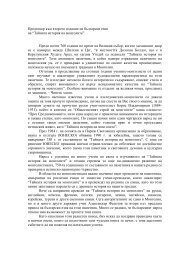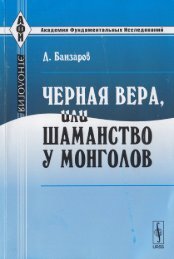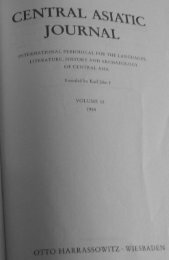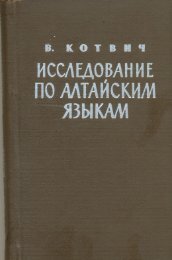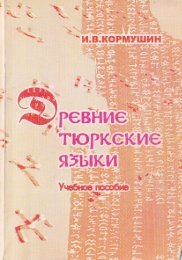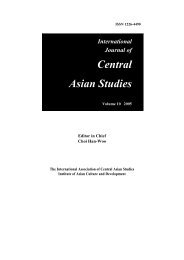- Page 1 and 2:
A GRAMMAR OF OLD TURKIC MARCEL ERDA
- Page 3 and 4:
CONTENTS I INTRODUCTION ...........
- Page 5 and 6:
CONTENTS ix 3.26 Aspect and tense .
- Page 7 and 8:
PREFACE Writing a grammar of Old Tu
- Page 9 and 10:
CHAPTER ONE INTRODUCTION Since preh
- Page 11 and 12:
INTRODUCTION 3 at least the suffix
- Page 13 and 14:
INTRODUCTION 5 Greek writing and be
- Page 15 and 16:
INTRODUCTION 7 further west, in the
- Page 17 and 18:
INTRODUCTION 9 äšgäk ’donkey
- Page 19 and 20:
INTRODUCTION 11 vowel roundings aft
- Page 21 and 22:
INTRODUCTION 13 the progressive var
- Page 23 and 24:
INTRODUCTION 15 Röhrborn declared
- Page 25 and 26:
INTRODUCTION 17 the letter P. As fo
- Page 27 and 28:
INTRODUCTION 19 due to contact with
- Page 29 and 30:
INTRODUCTION 21 it happens within o
- Page 31 and 32:
INTRODUCTION 23 simplified the work
- Page 33 and 34:
INTRODUCTION 25 of Ottoman which we
- Page 35 and 36:
INTRODUCTION 27 were any Uygur mss.
- Page 37 and 38:
INTRODUCTION 29 marks (used on grav
- Page 39 and 40:
INTRODUCTION 31 papers on Old Turki
- Page 41 and 42:
1.34. Dialectology and language cha
- Page 43 and 44:
INTRODUCTION 35 chosen for the sake
- Page 45 and 46:
CHAPTER TWO GRAPHEMICS, SPELLING, P
- Page 47 and 48:
PHONOLOGY 39 disparate places, be r
- Page 49 and 50:
PHONOLOGY 41 in the second Türk em
- Page 51 and 52:
PHONOLOGY 43 cautiously: Their spel
- Page 53 and 54:
PHONOLOGY 45 T II D (U 268) r10 and
- Page 55 and 56:
PHONOLOGY 47 written form the lette
- Page 57 and 58:
PHONOLOGY 49 91-94. Thus e.g. uu
- Page 59 and 60:
PHONOLOGY 51 syllables can be recon
- Page 61 and 62:
PHONOLOGY 53 course only be found i
- Page 63 and 64:
PHONOLOGY 55 systems, but also with
- Page 65 and 66:
PHONOLOGY 57 When we find the word
- Page 67 and 68:
PHONOLOGY 59 and of phonetics, can
- Page 69 and 70:
PHONOLOGY 61 two points are not suf
- Page 71 and 72:
PHONOLOGY 63 In referring to runifo
- Page 73 and 74:
PHONOLOGY 65 Turkic words 107 thoug
- Page 75 and 76:
PHONOLOGY 67 example beside the one
- Page 77 and 78:
PHONOLOGY 69 ¤ rces also appear to
- Page 79 and 80:
PHONOLOGY 71 and the ethnic name K
- Page 81 and 82:
PHONOLOGY 73 ancestors of the Khala
- Page 83 and 84:
PHONOLOGY 75 Manichæan and Uygur s
- Page 85 and 86:
PHONOLOGY 77 need not be expected t
- Page 87 and 88:
PHONOLOGY 79 velar pronunciation of
- Page 89 and 90:
PHONOLOGY 81 other modern languages
- Page 91 and 92:
PHONOLOGY 83 thinks that this might
- Page 93 and 94:
PHONOLOGY 85 explanation could be a
- Page 95 and 96:
PHONOLOGY vowel harmony because it
- Page 97 and 98:
PHONOLOGY Khotanese hippological gl
- Page 99 and 100:
PHONOLOGY twice nom+ug) appear to h
- Page 101 and 102:
PHONOLOGY sources. 165 The second s
- Page 103 and 104:
PHONOLOGY ¥¥ of ‘a big cooking
- Page 105 and 106:
PHONOLOGY 2.403. Syncopation and st
- Page 107 and 108:
PHONOLOGY Coda /X/ appears to have
- Page 109 and 110:
PHONOLOGY 101 from p, the latter sp
- Page 111 and 112:
PHONOLOGY 103 There seems to have b
- Page 113 and 114:
PHONOLOGY 105 orohini, the name of
- Page 115 and 116:
PHONOLOGY 107 in the Prajñ¥£¨¥
- Page 117 and 118:
PHONOLOGY 109 language), it would c
- Page 119 and 120:
PHONOLOGY 111 The shorter forms are
- Page 121 and 122:
PHONOLOGY 113 Alveolars are simplif
- Page 123 and 124:
PHONOLOGY 115 the same reason Uygur
- Page 125 and 126:
PHONOLOGY 117 The forms äm än- (t
- Page 127 and 128:
PHONOLOGY 119 beginning of verbal s
- Page 129 and 130:
PHONOLOGY 121 why, e.g., +dA does n
- Page 131 and 132:
PHONOLOGY 123 suffix -(X)gsA- becom
- Page 133 and 134:
PHONOLOGY 125 ‘to trip somebody
- Page 135 and 136:
PHONOLOGY 127 be able to’ (descri
- Page 137 and 138:
PHONOLOGY 129 case, as /ü/ in the
- Page 139 and 140:
PHONOLOGY 131 §¡ ¡¡ second ins
- Page 141 and 142:
PHONOLOGY 133 The emphatic clitic O
- Page 143 and 144:
PHONOLOGY 135 because a common vari
- Page 145 and 146:
CHAPTER THREE MORPHOLOGY Morphology
- Page 147 and 148:
MORPHOLOGY 139 certain relatively l
- Page 149 and 150:
MORPHOLOGY 141 urï. 249 In bii250
- Page 151 and 152:
MORPHOLOGY 143 forms adjectives tha
- Page 153 and 154:
MORPHOLOGY 145 subsequently turn to
- Page 155 and 156:
MORPHOLOGY 147 in karï+ltarak ‘u
- Page 157 and 158:
MORPHOLOGY 149 locked in or out by
- Page 159 and 160:
MORPHOLOGY 151 Elative content is a
- Page 161 and 162:
MORPHOLOGY 153 The formation in -(X
- Page 163 and 164:
MORPHOLOGY 155 often transparent (e
- Page 165 and 166:
MORPHOLOGY 157 further, the group i
- Page 167 and 168:
MORPHOLOGY 159 person was being add
- Page 169 and 170:
MORPHOLOGY 161 bän. Labials in the
- Page 171 and 172:
MORPHOLOGY 163 plural possessive en
- Page 173 and 174:
MORPHOLOGY 165 ‘in whatever way
- Page 175 and 176:
MORPHOLOGY 167 ... körüp ‘perce
- Page 177 and 178:
MORPHOLOGY 169 The vast majority of
- Page 179 and 180:
MORPHOLOGY 171 Zieme 1991: 24-25 gi
- Page 181 and 182:
MORPHOLOGY 173 dative. 294 It canno
- Page 183 and 184:
MORPHOLOGY 175 would (after a round
- Page 185 and 186:
MORPHOLOGY 177 suffix is often adde
- Page 187 and 188:
MORPHOLOGY 179 only with a limited
- Page 189 and 190:
MORPHOLOGY 181 well. But then, it c
- Page 191 and 192:
MORPHOLOGY 183 wg 1 l 1 n 1 m:r 2 d
- Page 193 and 194:
MORPHOLOGY 185 E7,4 probably shows
- Page 195 and 196:
MORPHOLOGY 187 only after vowels, w
- Page 197 and 198:
MORPHOLOGY 189 In Abhi there are a
- Page 199 and 200:
MORPHOLOGY 191 nominal categories,
- Page 201 and 202:
MORPHOLOGY 193 MYNY in four other i
- Page 203 and 204:
MORPHOLOGY 195 pronouns (which serv
- Page 205 and 206:
MORPHOLOGY 197 hardly have anything
- Page 207 and 208:
MORPHOLOGY 199 3.132 Demonstratives
- Page 209 and 210:
MORPHOLOGY 201 postpositions and, i
- Page 211 and 212:
MORPHOLOGY 203 attested only in the
- Page 213 and 214: MORPHOLOGY 205 The anï¨ hapax ïn
- Page 215 and 216: MORPHOLOGY 207 second and third run
- Page 217 and 218: MORPHOLOGY 209 With käntü in the
- Page 219 and 220: MORPHOLOGY 211 unites different fun
- Page 221 and 222: MORPHOLOGY 213 (MaitH XI 15v25)
- Page 223 and 224: MORPHOLOGY 215 . 386 ¡ is probabl
- Page 225 and 226: MORPHOLOGY 217 t[u]g[mïš] ärsär
- Page 227 and 228: MORPHOLOGY 219 £££ (U IV C 152)
- Page 229 and 230: MORPHOLOGY 221 seven days’ 396 us
- Page 231 and 232: MORPHOLOGY 223 ‘second’ is äki
- Page 233 and 234: MORPHOLOGY 225 Collectives in +(A)g
- Page 235 and 236: MORPHOLOGY 227 ‘silver’ or . D
- Page 237 and 238: MORPHOLOGY 229 objects.Verbs formed
- Page 239 and 240: MORPHOLOGY 231 ‘they are said to
- Page 241 and 242: 3.23. Finite verb forms MORPHOLOGY
- Page 243 and 244: MORPHOLOGY 235 the sentence was und
- Page 245 and 246: MORPHOLOGY 237 seems to be quite ra
- Page 247 and 248: MORPHOLOGY 239 stop after /l n r/ a
- Page 249 and 250: MORPHOLOGY 241 survive very well in
- Page 251 and 252: MORPHOLOGY 243 -gA, which is retain
- Page 253 and 254: MORPHOLOGY 245 partly lexical meani
- Page 255 and 256: MORPHOLOGY 247 moment of speaking o
- Page 257 and 258: MORPHOLOGY 249 In Uygur the auxilia
- Page 259 and 260: MORPHOLOGY 251 marked way: It denot
- Page 261 and 262: MORPHOLOGY 253 tut- ‘to hold’ i
- Page 263: MORPHOLOGY 255 subordinated to täg
- Page 267 and 268: MORPHOLOGY 259 however, joined in s
- Page 269 and 270: MORPHOLOGY 261 by the converb follo
- Page 271 and 272: MORPHOLOGY 263 these four terms: wh
- Page 273 and 274: MORPHOLOGY 265 oglanï sävär (Pot
- Page 275 and 276: MORPHOLOGY 267 for the proposal. ¥
- Page 277 and 278: MORPHOLOGY 269 indirective answer:
- Page 279 and 280: MORPHOLOGY 271 which I have come ac
- Page 281 and 282: MORPHOLOGY 273 why we are dealing w
- Page 283 and 284: MORPHOLOGY 275 modern Turkic langua
- Page 285 and 286: MORPHOLOGY 277 denoted by the verb
- Page 287 and 288: MORPHOLOGY 279 is more nouny (and h
- Page 289 and 290: MORPHOLOGY 281 ¡ f the taking of o
- Page 291 and 292: MORPHOLOGY 283 and - e.g., are comm
- Page 293 and 294: MORPHOLOGY 285 either on the head o
- Page 295 and 296: MORPHOLOGY 287 died’ (HTs VII 191
- Page 297 and 298: MORPHOLOGY 289 form also in the (ru
- Page 299 and 300: MORPHOLOGY 291 12,6 or 30,9-10) but
- Page 301 and 302: MORPHOLOGY 293 in M III Nr.7 II r 5
- Page 303 and 304: MORPHOLOGY 295 nominal but itself s
- Page 305 and 306: MORPHOLOGY 297 inscriptional -mIš
- Page 307 and 308: MORPHOLOGY 299 [kï]lïn£¥ £¥
- Page 309 and 310: MORPHOLOGY curse him incessantly’
- Page 311 and 312: MORPHOLOGY 303 realm of your empero
- Page 313 and 314: MORPHOLOGY 305 kurtulgu tïnlïglar
- Page 315 and 316:
MORPHOLOGY 307 ‘You are marvellou
- Page 317 and 318:
MORPHOLOGY 309 and bye 498 it has b
- Page 319 and 320:
MORPHOLOGY 311 ausgedehnt”. 501 T
- Page 321 and 322:
MORPHOLOGY 313 follows ... The resu
- Page 323 and 324:
MORPHOLOGY 315 Some of the petrifie
- Page 325 and 326:
MORPHOLOGY 317 but treat him as an
- Page 327 and 328:
MORPHOLOGY 319 tuydokumuzda ‘when
- Page 329 and 330:
MORPHOLOGY 321 In the runiform insc
- Page 331 and 332:
MORPHOLOGY 323 [oron]ta bolmaz (HTs
- Page 333 and 334:
MORPHOLOGY 325 (PañcÖlm 49) ‘Th
- Page 335 and 336:
MORPHOLOGY 327 one of whose functio
- Page 337 and 338:
MORPHOLOGY 329 guard the body’ .
- Page 339 and 340:
MORPHOLOGY 331 67r11. 531 +dXn nomi
- Page 341 and 342:
MORPHOLOGY 333 Still other postposi
- Page 343 and 344:
MORPHOLOGY 335 The border between c
- Page 345 and 346:
3.33. Conjunctions MORPHOLOGY 337 C
- Page 347 and 348:
MORPHOLOGY 339 The source £ of run
- Page 349 and 350:
MORPHOLOGY 341 The postposition öt
- Page 351 and 352:
MORPHOLOGY 343 3.341. Emphatic part
- Page 353 and 354:
MORPHOLOGY 345 A particle is in Su
- Page 355 and 356:
MORPHOLOGY 347 ïnmatïn ... iši
- Page 357 and 358:
MORPHOLOGY 349 takï is both a conj
- Page 359 and 360:
MORPHOLOGY 351 3.344. Volitive part
- Page 361 and 362:
MORPHOLOGY 353 The §3 of the UW en
- Page 363 and 364:
MORPHOLOGY 355 ‘your majesty’ (
- Page 365 and 366:
CHAPTER FOUR SYNTAX Texts consist o
- Page 367 and 368:
SYNTAX 359 German 560 can also, in
- Page 369 and 370:
SYNTAX 361 The function of the nomi
- Page 371 and 372:
SYNTAX 363 kö©©¡ deeds’, amï
- Page 373 and 374:
SYNTAX 365 also be referred to by a
- Page 375 and 376:
SYNTAX 367 ‘he gives (it) to othe
- Page 377 and 378:
SYNTAX 369 ‘The prophet Christ ca
- Page 379 and 380:
SYNTAX 371 had strictly directive m
- Page 381 and 382:
SYNTAX 373 ¡ ‘in’, ‘before
- Page 383 and 384:
SYNTAX 375 from the divine land’.
- Page 385 and 386:
SYNTAX 377 III 47,19) and ¨¥ up (
- Page 387 and 388:
SYNTAX 379 The instrumental express
- Page 389 and 390:
SYNTAX 381 371. 576 Proper names fo
- Page 391 and 392:
SYNTAX 383 Relatively rarely the at
- Page 393 and 394:
SYNTAX 385 sezinti (Suv 630,10) ‘
- Page 395 and 396:
SYNTAX 387 spring’. Partitive mea
- Page 397 and 398:
SYNTAX 389 4.124. Nominal phrases w
- Page 399 and 400:
SYNTAX 391 As postpositions they ca
- Page 401 and 402:
SYNTAX 393 phrase; as shown by the
- Page 403 and 404:
SYNTAX 395 ‘towards the divine ru
- Page 405 and 406:
SYNTAX 397 ü anï ‘therefore’
- Page 407 and 408:
SYNTAX 399 When a genitive of any n
- Page 409 and 410:
SYNTAX 401 ‘hereupon’ (BT II 15
- Page 411 and 412:
SYNTAX 403 ulatï ‘others in addi
- Page 413 and 414:
SYNTAX 405 acquire a human body are
- Page 415 and 416:
SYNTAX 407 Then there are relationa
- Page 417 and 418:
4.23. Supine constructions SYNTAX 4
- Page 419 and 420:
SYNTAX 411 Turkic, while bürtgäli
- Page 421 and 422:
SYNTAX 413 The following pasage in
- Page 423 and 424:
SYNTAX 415 comment, in this case ad
- Page 425 and 426:
SYNTAX 417 kutrulmaklag urug tarïg
- Page 427 and 428:
4.32. Verbal sentence patterns SYNT
- Page 429 and 430:
SYNTAX 421 Participles are adjectiv
- Page 431 and 432:
SYNTAX 423 predicate. Otherwise, th
- Page 433 and 434:
SYNTAX 425 kim bo yarokun ärmäk[i
- Page 435 and 436:
SYNTAX 427 timing (üd), the sons o
- Page 437 and 438:
SYNTAX 429 up stronger than fire? .
- Page 439 and 440:
SYNTAX 431 finite form (here äšid
- Page 441 and 442:
SYNTAX 433 defined by the verb in q
- Page 443 and 444:
SYNTAX 435 have been wrong to trans
- Page 445 and 446:
SYNTAX 437 the other examples I hav
- Page 447 and 448:
SYNTAX 439 let itself get into an a
- Page 449 and 450:
SYNTAX 441 ïn ‘meditation by whi
- Page 451 and 452:
SYNTAX 443 stayed’ , on the other
- Page 453 and 454:
SYNTAX 445 In the following Manich
- Page 455 and 456:
SYNTAX 447 between the two clauses
- Page 457 and 458:
SYNTAX 449 Subject and object claus
- Page 459 and 460:
SYNTAX 451 sentences are nominal, b
- Page 461 and 462:
SYNTAX 453 liked going out 631 to t
- Page 463 and 464:
SYNTAX 455 to earth and attain Budd
- Page 465 and 466:
SYNTAX 457 postposition in question
- Page 467 and 468:
SYNTAX 459 them elaborately’. The
- Page 469 and 470:
SYNTAX 461 precede here, as the que
- Page 471 and 472:
SYNTAX 463 In ¡©¤¡¡ ïg sözl
- Page 473 and 474:
SYNTAX 465 kamag kalïn kuvrag ärt
- Page 475 and 476:
SYNTAX 467 ‘Crying, wailing and s
- Page 477 and 478:
SYNTAX 469 fol.131) the form appear
- Page 479 and 480:
SYNTAX 471 ¡§§§¡¡¡§ content
- Page 481 and 482:
SYNTAX 473 The infinitive phrase §
- Page 483 and 484:
SYNTAX 475 (M I 10,5) ‘Innumerabl
- Page 485 and 486:
SYNTAX 477 instance is the only one
- Page 487 and 488:
SYNTAX 479 has two different meanin
- Page 489 and 490:
SYNTAX 481 etiglig adakïn ma £
- Page 491 and 492:
SYNTAX 483 referred to in that subo
- Page 493 and 494:
SYNTAX 485 yarlïkadokïn ü (KT S9
- Page 495 and 496:
SYNTAX 487 baš[ïn] közin agrïtu
- Page 497 and 498:
SYNTAX 489 Orkhon Turkic clauses su
- Page 499 and 500:
SYNTAX 491 evoke a yearning towards
- Page 501 and 502:
SYNTAX 493 yarotsar 660 (M I 15,3)
- Page 503 and 504:
SYNTAX 495 meaning remains conditio
- Page 505 and 506:
SYNTAX 497 ‘In case, however, one
- Page 507 and 508:
SYNTAX 499 18 and 27-28 we have bot
- Page 509 and 510:
SYNTAX 501 ïg kïlïn £ (U IV C 1
- Page 511 and 512:
SYNTAX 503 anger’. Note that the
- Page 513 and 514:
SYNTAX 505 saying or thinking such
- Page 515 and 516:
SYNTAX 507 oral communication have
- Page 517 and 518:
SYNTAX 509 by repeated particles as
- Page 519 and 520:
SYNTAX 511 ï ... tä §§ ïn ä
- Page 521 and 522:
SYNTAX 513 prominence to the causal
- Page 523 and 524:
CHAPTER FIVE PRAGMATICS AND MODALIT
- Page 525 and 526:
PRAGMATICS AND MODALITY 517 (TT X 2
- Page 527 and 528:
PRAGMATICS AND MODALITY 519 also te
- Page 529 and 530:
PRAGMATICS AND MODALITY 521 p of th
- Page 531 and 532:
PRAGMATICS AND MODALITY 523 a Chine
- Page 533 and 534:
PRAGMATICS AND MODALITY 525 The use
- Page 535 and 536:
PRAGMATICS AND MODALITY 527 wish co
- Page 537 and 538:
PRAGMATICS AND MODALITY 529 used in
- Page 539 and 540:
CHAPTER SIX NOTES ON THE LEXICON Th
- Page 541 and 542:
NOTES ON THE LEXICON 533 A quite co
- Page 543 and 544:
NOTES ON THE LEXICON 535 ungen” a
- Page 545 and 546:
BIBLIOGRAPHY This bibligraphy inclu
- Page 547 and 548:
BIBLIOGRAPHY Abduraxmanov, G.A. 196
- Page 549 and 550:
BIBLIOGRAPHY 541 Brockelmann, C. 19
- Page 551 and 552:
BIBLIOGRAPHY 543 — 1986: Constrai
- Page 553 and 554:
BIBLIOGRAPHY 545 — 1993: Graphie
- Page 555 and 556:
BIBLIOGRAPHY 547 Jahrestag der Wied
- Page 557 and 558:
BIBLIOGRAPHY 549 — 1981: Zum Wand
- Page 559 and 560:
BIBLIOGRAPHY 551 Sims-Williams, N.
- Page 561 and 562:
BIBLIOGRAPHY 553 — 1986: ol v ran
- Page 563 and 564:
INDEX OF TERMS AND NOTIONS This ind
- Page 565 and 566:
diacritics 37 dialects 5-6, 8-16, 2
- Page 567 and 568:
lowering 13, 16, 34- 35, 43-44, 59-
- Page 569 and 570:
ounding 11, 14-15, 92-94 runiform i
- Page 571 and 572:
INDEX OF OLD TURKIC ELEMENTS This i
- Page 573 and 574:
INDEX OF OLD TURKIC ELEMENTS 565 bi
- Page 575 and 576:
INDEX OF OLD TURKIC ELEMENTS 567 -g
- Page 577 and 578:
INDEX OF OLD TURKIC ELEMENTS 569 /l
- Page 579 and 580:
INDEX OF OLD TURKIC ELEMENTS 571 +n
- Page 581 and 582:
INDEX OF OLD TURKIC ELEMENTS 573 +(
- Page 583:
INDEX OF OLD TURKIC ELEMENTS 575 -(


